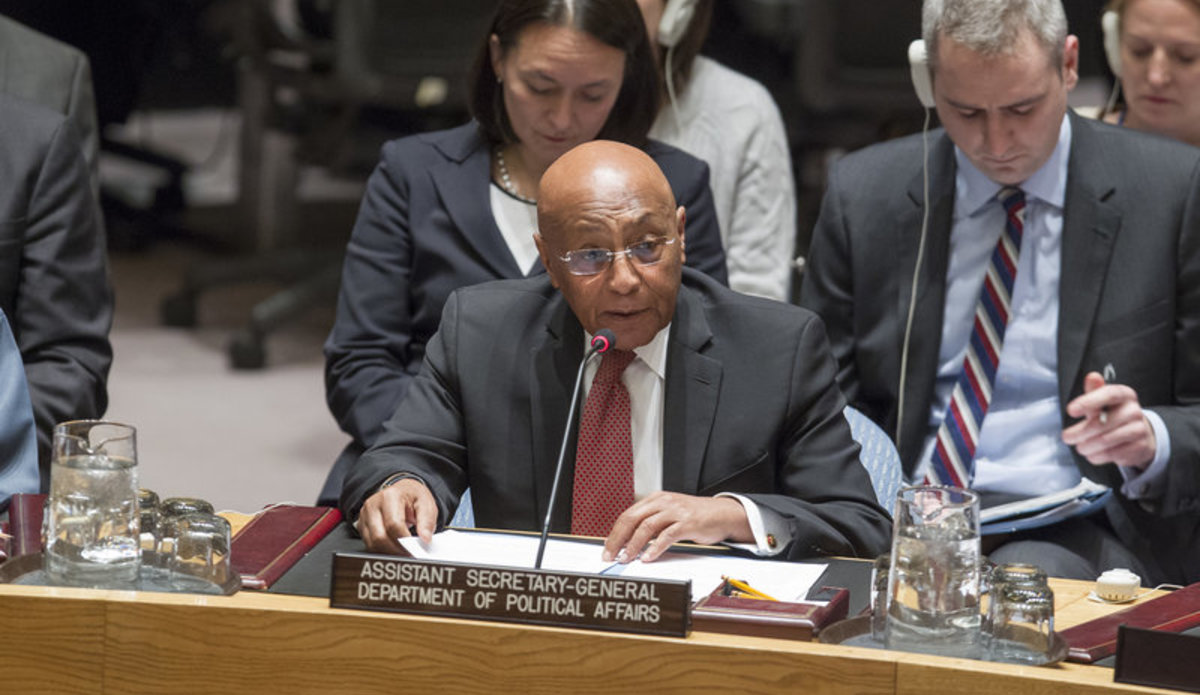Mr. President,
Members of the Security Council,
Excellencies,
Ladies and Gentlemen,
The Security Council meets at a time when the situation in the Democratic People’s Republic of Korea (DPRK) is attracting increased world attention and concern.
The report of the Secretary-General to the General Assembly on the “Situation of human rights in the Democratic People’s Republic of Korea” was issued earlier this month. The General Assembly adopted the resolution on the human rights situation in the Democratic People’s Republic of Korea on 18 December, and, on 19 December, the Federal Bureau of Investigation of the United States (FBI) issued a report alleging that the Democratic People’s Republic of Korea was responsible for the recent cyber-attack targeting Sony Pictures Entertainment.
The Secretary-General is aware of the FBI’s report. He is also aware that the Democratic People’s Republic of Korea has denied any involvement. The United Nations is not privy to the information on which the FBI’s conclusions are based. However, the rise in the incidence and severity of cyber-attacks is of increasing concern.
Mr. President,
The Commission of Inquiry established by the Human Rights Council gave voice to the many victims of grave human rights violations and provided a roadmap for the Democratic People’s Republic of Korea to adhere to universal human rights standards. The Commission concluded that [And I quote]: “The gravity, scale and nature of the violations reveal a State that does not have any parallel in the contemporary world”. [End of quote].
The Commission also reframed and changed the tone of the discussion on the Democratic People’s Republic of Korea. It is not just the nuclear issue that deserves international attention and action. The discussion in the Security Council today allows for a more comprehensive assessment and action when addressing security and stability concerns in the Korean Peninsula.
In keeping with its obligations under international law, the Democratic People’s Republic of Korea has a responsibility to protect its population from the most serious international crimes. The international community also has a collective responsibility to protect the population of the Democratic People’s Republic of Korea, and to consider the wider implications of the reported grave human rights situation for the stability of the region.
Mr. President,
For the first time in 15 years, Foreign Minister Ri Su Yung of the Democratic People’s Republic of Korea attended the General Assembly Debate in September 2014 and met with the Secretary-General, confirming the commitment of his country to sustaining and continuing the dialogue. The Democratic People’s Republic of Korea has also undertaken active diplomatic activities around the world, including in Europe, East Africa and Northeast Asia, and engaged more substantively with the United Nations human rights system, such as the Universal Periodic Review.
These signals of engagement offer an important opportunity for the United Nations and the wider international community to redouble efforts towards building trust, dialogue and cooperation on all tracks. It is also an opportunity for the Democratic People’s Republic of Korea to work with the international community to improve the human rights situation and the living conditions of the people of the country.
Mr. President,
The Democratic People’s Republic of Korea has issued official statements making clear its objection to the General Assembly resolution on the human rights situation in the country and, on 9 December, the Spokesperson of the Foreign Ministry gave a strong reaction to the meeting of the Security Council today. While the Democratic People’s Republic of Korea had raised the possibility of conducting a fourth nuclear test in its statements immediately before and after the Third Committee vote, its recent statements have refrained from such references.
The Secretary-General notes that the international community is firm and united in affirming that the Democratic People’s Republic of Korea cannot have the status of a nuclear-weapon State in accordance with the Treaty on the Non-Proliferation of Nuclear Weapons. There is strong international consensus on the need for the verifiable denuclearization of the Korean Peninsula. In this context, the Six-Party Talks remains a viable mechanism to achieve irreversible denuclearization and to maintain peace and security in the Korean Peninsula. The 2005 Joint Statement remains a solid framework for addressing these issues through dialogue and negotiations.
While the non-proliferation, political, human rights, economic and security challenges are interrelated and mutually reinforcing, the United Nations urges Member States to increase humanitarian assistance for those in need in the Democratic People’s Republic of Korea. The United Nations-led humanitarian response in the Democratic People’s Republic of Korea is of high quality and life-saving, with a measurable impact on the lives of the most vulnerable. The response, however, is hampered by a funding deficit, which has been exacerbated by sanctions.
Mr. President,
Next year will mark the 70th anniversary of the end of World War II, the founding of the United Nations, as well as the division of the Korean Peninsula. The Korean question has remained unresolved for so long and the situation on the Peninsula remains fragile and volatile. Inter-Korean relations have remained deadlocked, and family members separated for far too long.
Restarting credible dialogue and meaningful engagement would be an important step to overcome the current standoff regarding the situation on the Korean Peninsula, and should go hand-in-hand with efforts to ensure accountability. The United Nations will continue its engagement on both fronts and counts on the active support of the international community, especially the countries in the region. Sustained international efforts would be important in supporting these efforts. All concerned parties should work to make 2015 a pivotal year to improve the human rights situation in the Democratic People’s Republic of Korea and to move toward a denuclearized and peaceful Korean Peninsula.
Thank you, Mr. President.
A full transcript of the meeting is available at http://www.un.org/en/ga/search/view_doc.asp?symbol=S/PV.7353.

